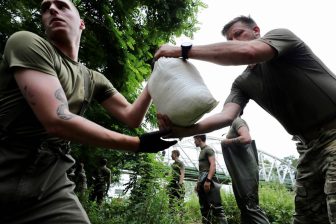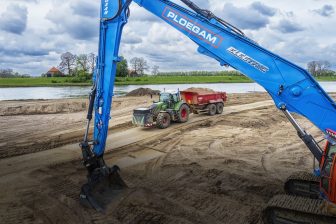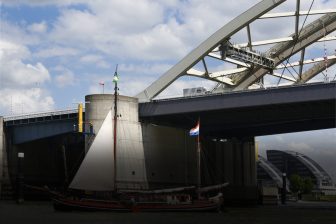10th International Conference on Asphalt Pavements
White Bear Lake, MN, United States of America – The international pavement engineering community is invited to Québec City in August
2006, for the 10th Annual International Conference on Asphalt Pavements. The local organizing committee has assembled the necessary resources and expertise to
ensure that the conference, held for the first time in Canada, is a rich scientific,
social and cultural experience for all delegates in attendance.
In the tradition of preceding conferences, Université Laval and
the Ministère des Transports du Québec will join with the
International Society for Asphalt Pavements to share
their unique experience and provide a new
opportunity to discuss the latest developments
in asphalt pavement technology
at the 10th Annual International
Conference on Asphalt
Pavements, to be held
August 12 to 17,
2006, in beautiful
Québec
City.
The Conference
The conference will be held at the Québec City
Convention Centre, a recently inaugurated facility
combining ultra-modern technology and oldfashioned
attention to detail and service.
Located in the heart of downtown, the Québec
City Convention Centre offers all the amenities
and technology needed to make the 10th Annual
International Conference on Asphalt Pavements
a success. Conference goers will only be a few
steps away from the many museums, restaurants,
bars, and attractions Québec City has to offer.
Building on the vast experience of previous
meetings as well as the unique features of the
city, the Québec City conference will offer a rich
blend of scientific and social events.
Special pre-conference activities (short courses
and workshops) will be held in two continuing
education centres at Université Laval. Pavillon La
Laurentienne is a modern facility with several
state-of-the-art conference rooms that can
accommodate groups of 20 to 300 people. The
special session on low volume roads will be held
at the Forêt Montmorency Research Centre,
located in the Montmorency Valley experimental
forest on the Laurentian Plateau, 60 km north of
Québec City. The centre offers a full range of
conference services and is also the site of SERUL
(Université Laval Experimental Road Site), which
conference attendees will visit during the session.
Transportation between the conference
hotel and these centres will be provided for people
registered for pre-conference activities.
Conference Themes
The themes for the 10th Annual International
Conference on Asphalt Pavements, sponsored
by the International Society of Asphalt
Pavements (ISAP) have been selected to reflect
recent developments in asphalt pavement
technology and to be of interest to researchers
and practitioners. All categories of roads will be
considered including regional and national
freeways, arterials, collectors and municipal
as well as local roads. Papers dealing with the
state-of-the-art, state of the practice and cases
studies are expected to be part of the program.
Developments in Asphalt Pavement Materials
Traffic volumes have increased considerably over
the past few decades. Moreover, modern trucks
are heavier and are carried by fewer tires which
have higher tire pressures. This results in more
aggressive damage to pavements as compared to
that of twenty years ago. In response to both
changes in the environment and changes in the
loading, pavement materials have followed a constant
evolution. Mix design procedures are now
based on physical properties of constituents and
mixes. The mix design and testing technologies
has evolved rapidly in the past few years with the
Superpave developments in the America and
European Asphalt standardization. The needs
are considerable: hot mix asphalt concrete with
high resistance to rutting and cracking, long
lasting pavement surfaces, economic alternatives
for low volume roads, and more. Pavement
granular materials do not receive as much attention
as bound materials but considerable
progress has been made in the understanding of
their behaviour and on their characterization.
These developments are opening new perspectives
with respect to material development,
characterization, production and use. New materials
can now be developed using recycled or
synthetic components and adapted to local site
conditions.
The conference will focus on these recent
developments. Conference topics will include:
- Asphalt mix design
- Low-cost surfacing materials
- In situ and laboratory characterization
and modelling of pavement materials - Improving the performance of granular base
materials - Valorization of processed materials and
by-products
Structural Design for New and Existing Pavements
Mechanical-empirical design procedures have
been used for several decades. They are however
still being reinvented! Recent efforts in
accumulating long-term pavement performance
data through international LTPP programs and
accelerated testing programs have led to the
development of a new generation of more robust
distress-specific performance models. During
that period, the quantum development of modern
computers has made powerful new tools
available to practitioners. It is now possible to
take into consideration various types of axle
loads and configurations as well as their temporal
variation into structural design calculations.
This is also true for diurnal and seasonal
variations in material properties for damage prediction.
The 2006 conference program will focus on
these recent developments and their implementation.
Conference topics will include:
- Development of long-lasting pavements
- Validation and implementation of the 2002
Pavement Design Guide - Effects of European standardization of truck
weights and dimensions - Pavement vehicle interaction
- Low-volume road design
- Accounting for frost action and seasonal
effects
Pavement Performance
In order to support the development of
mechanical-empirical design procedures, collecting
and analyzing pavement performance
data has become a key activity in pavement
engineering. Several monitoring techniques and
standards have been developed and implemented
in long-term performance studies and accelerated
testing programs. New sophisticated
monitoring tools and instruments have emerged.
The technical program of the 2006 Conference
will focus on the achievements made over the
past few years in pavement performance studies.
The program will include the following topics:
- Long-term performance studies
- Full-scale and accelerated pavement testing
- Measuring pavement performance
- Pavement instrumentation
- Modelling pavement deterioration
- Performance indicators for pavement management
- Lessons learnt from pavement performance programs
Pavement Investigation and Analysis
Restoring structural and functional condition
of existing pavements remains the most important
pavement engineering activity for the
majority of highway administrators. Decisions
made at that level and solutions adopted rely
heavily on the quality of the assessment of
pavement condition. Analysis techniques based
on falling weight deflectometer (FWD) including
backcalculation of layer moduli and based on longitudinal
and transverse profile analysis have
been widely used and documented since the
introduction of reliable and productive testing
equipment in the seventies and the eighties.
Promising technology for the collection and the
analysis of pavement surface distress data is
emerging but still needs refinement. These
analysis techniques are still being improved and
new, innovative testing techniques are now
being developed. Innovations in pavement
investigation and analysis technology will also
occupy an important place in the conference
program, which will include the following topics:
- New developments in the backcalculation of
pavement layer moduli - Innovative approaches to the interpretation of deflection data
- Developments in non-destructive pavement
analysis - Pavement profile analysis
- Collection and analysis of distress data
- Characteristics of safe pavements
- Pavement noise
- Measurement and analysis of other surface
characteristics
Highway Operations
As long as pavements exist, they will always
need to be maintained and managed. Several
new management models have been developed
and implemented. Some have proven to be
effective; others have not. The conference program
will focus on two important aspects of
highway operations. The first one deals with management models, and will include topics
such as:
- Partnership in pavement construction and
maintenance - Performance-based contracts and
specifications - Risk management in pavement construction
- Quality systems
The second aspect of highway operations will
address specific technical and organizational
issues, and will include topics such as:
- Reduction of user disturbance
- Preventative maintenance
- Pavement preservation tools
- Sustainable development
- Safety issues
Conference papers will be published on CDROM,
complete with a detailed conference program
and a deluxe abstract book. Arrangements
will be made to have computer rooms available
to delegates to allow for reviewing and printing
papers at the conference site.
The official language at the conference will be
English. Audiovisual facilities will include the
usual slide, video, and computer projection
equipment.
The conference will also include an exhibition of
the latest in asphalt pavement technologies and
services.
U las zojuist één van de gratis premium artikelen
Onbeperkt lezen? Profiteer nu van de introductieaanbieding voor € 10,- per maand.
Bent u al abonnee?



